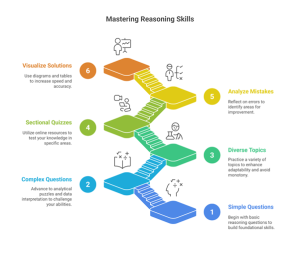How to Balance English and Reasoning in UPSC EPFO Preparation?

Team L&M
Maintaining a balance between English and Reasoning in your UPSC EPFO preparation is something that not all aspirants can achieve. UPSC EPFO exam is a competitive exam, and these two subjects form very essential parts of the exam.
The combination of UPSC EPFO online preparation methods and the knowledge of the UPSC EPFO syllabus is needed to successfully pass this exam.
Let us look at some effective strategies to tackle both topics and not cause your study schedule to become too daunting.
The Role of English and Reasoning in UPSC EPFO
- The English and Reasoning sections make up a significant part of the exam, which is clearly outlined in the UPSC EPFO syllabus.
- English does not just test grammar and vocabulary, but also comprehension, fast reading, and error identification.
- Reasoning, on the other hand, requires logical reasoning, fast analysis, pattern identification, and solving puzzles within a time limit.
- Failure to perform in one of the sections may reduce your score because the sections are scored separately, and mistakes in these sections are not easily made up for in the other sections.
Breakdown of the UPSC EPFO Syllabus
English Section Topics:
- Reading comprehension
- Grammar rules (including tenses, prepositions, subject-verb agreement)
- Error Detection
- Synonyms & Antonyms
- Sentence Completion
- Para Jumbles
- Idioms and Phrases
- Cloze Tests
- One-Word Substitutions
Reasoning Section Topics:
- Coding-Decoding
- Blood Relations
- Sequences and Series
- Direction Sense
- Logical Deductions
- Syllogisms
- Data Interpretation
- Analytical Puzzles
- Input-Output-Based Logical Questions
Strategy for Balanced Preparation: English and Reasoning
- Be consistent. Make a habit of going through both subjects each week to gradually progress.
- Rather than dividing days into English and Reasoning, fit both into your daily routine (i.e., an hour of each).
- Example Timetable:
- Morning: 45 min. practice of English (comprehension, vocabulary, grammar exercises)
- Evening: 45 min Reasoning (puzzles, logic games, data interpretation)
- Revise on weekends and take complete mock tests with mixed questions in both portions, which are similar to a real-life exam.
English: Approaches for Improvement
- Read English newspapers, editorials, or reputed magazines This automatically enhances the understanding and vocabulary, which is important in the UPSC EPFO syllabus.
- Write new words, idioms, and challenging expressions in a notebook Read and practice in sentences to aid memory.
- Take up grammar tests and last year’s English papers that can be found on UPSC EPFO online preparation sites.
- Read through error logs. Mark common grammatical errors, and revise them again and again to correct them quickly.
- In case you have trouble comprehending sentences within time limits, listen to quality English podcasts or news bulletins.
Reasoning: Building Logical Strength
- Start with simple types of reasoning questions and move up the difficulty level to more complex questions, such as analytical puzzles and data interpretation.
- Allocate time for solving a good mix of topics to avoid monotony and improve adaptability during the exam.
- On any UPSC EPFO online preparation site, you can take sectional quizzes, tests on specific topics, and watch video solutions.
- After each practice exam, figure out what went wrong. Was it a misunderstanding of the concept, an error in the calculations, or just a mistake made in a hurry?
- Make tables or diagrams on puzzles and syllogisms; visualization increases speed and accuracy.
Maximizing Benefits from UPSC EPFO Online Preparation
- Trustworthy websites provide well-organized day-wise schedules, mock exams, and interactive lectures that are based on the UPSC EPFO syllabus.
- Attend live workshops or question-answering forums. These provide expert tips on how to balance subjects and manage difficult questions.
- Online tools can be used to remind you to revise each day, keep error records, and monitor progress in both subjects.
Importance of Revision and Assessment
- Devote a day in a week to revision, both grammatical rules and patterns of reasoning, and practice your weak points.
- Practise the full-length mock tests, and alternate between English and Reasoning as your starting point. This provides flexibility in the real examination situation.
- Measure your performance based on what online analytics reveals that many reputed platforms provide, and work on minimizing the number of mistakes you make along the way.
Some Tips for Effective Preparation
- Make specific targets for English and Reasoning, weekly and monthly, and be consistent with them.
- Don’t be afraid of tough subjects. Divide them down, watch online tutorials, and retry till you are comfortable.
- Reduce stress by juggling subjects and using action-based techniques such as group discussions and peer quizzes.
- Be sure to balance your preparations across both subjects so you don’t get swamped with one subject only, and that way, you can make your study sessions less boring.
Final Word
English and Reasoning balance does not mean equalizing the time spent on two subjects, but progressing evenly in both.
The best tools are smart use of UPSC EPFO online preparation resources, sticking to the UPSC EPFO syllabus, and frequent, truthful self-evaluation.
Be consistent and open to learning new things, and you will see that both English and Reasoning become your strengths as you aim to clear the UPSC EPFO exam.



